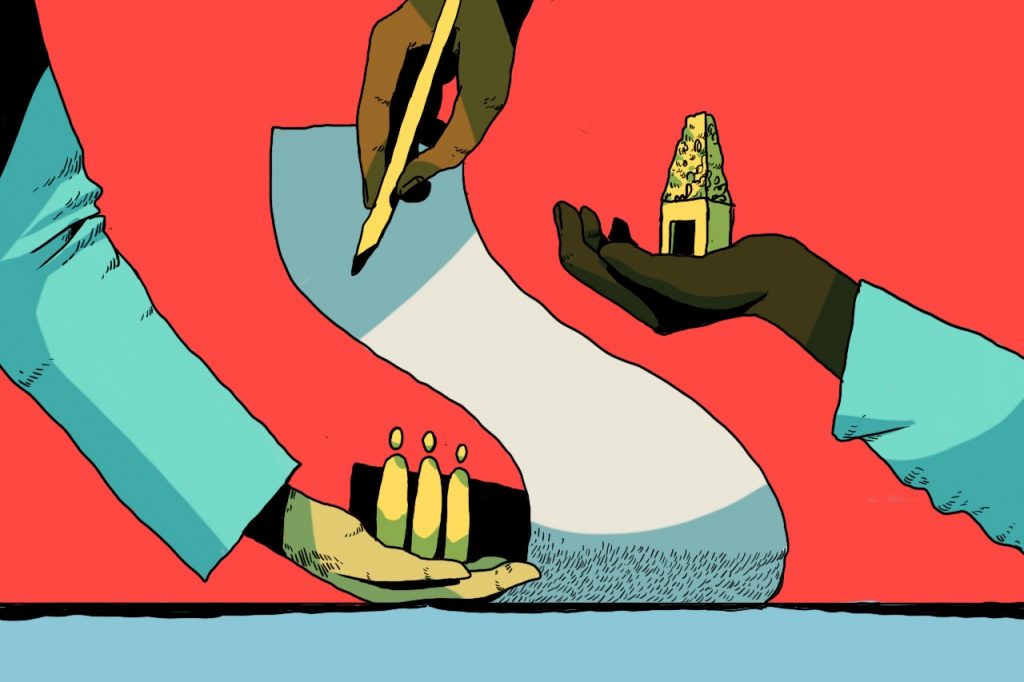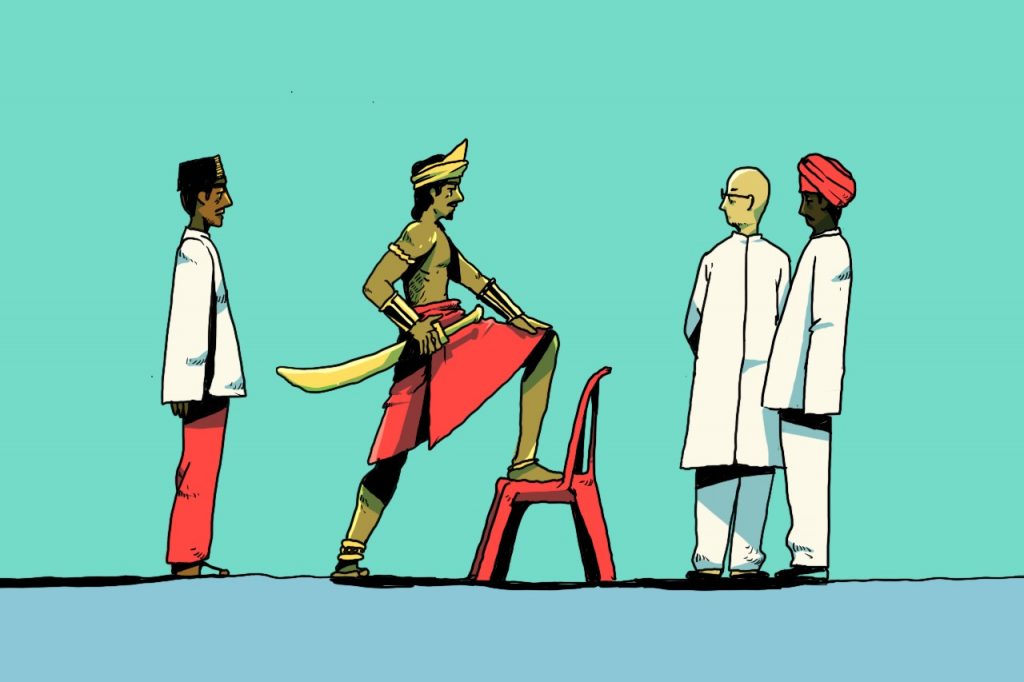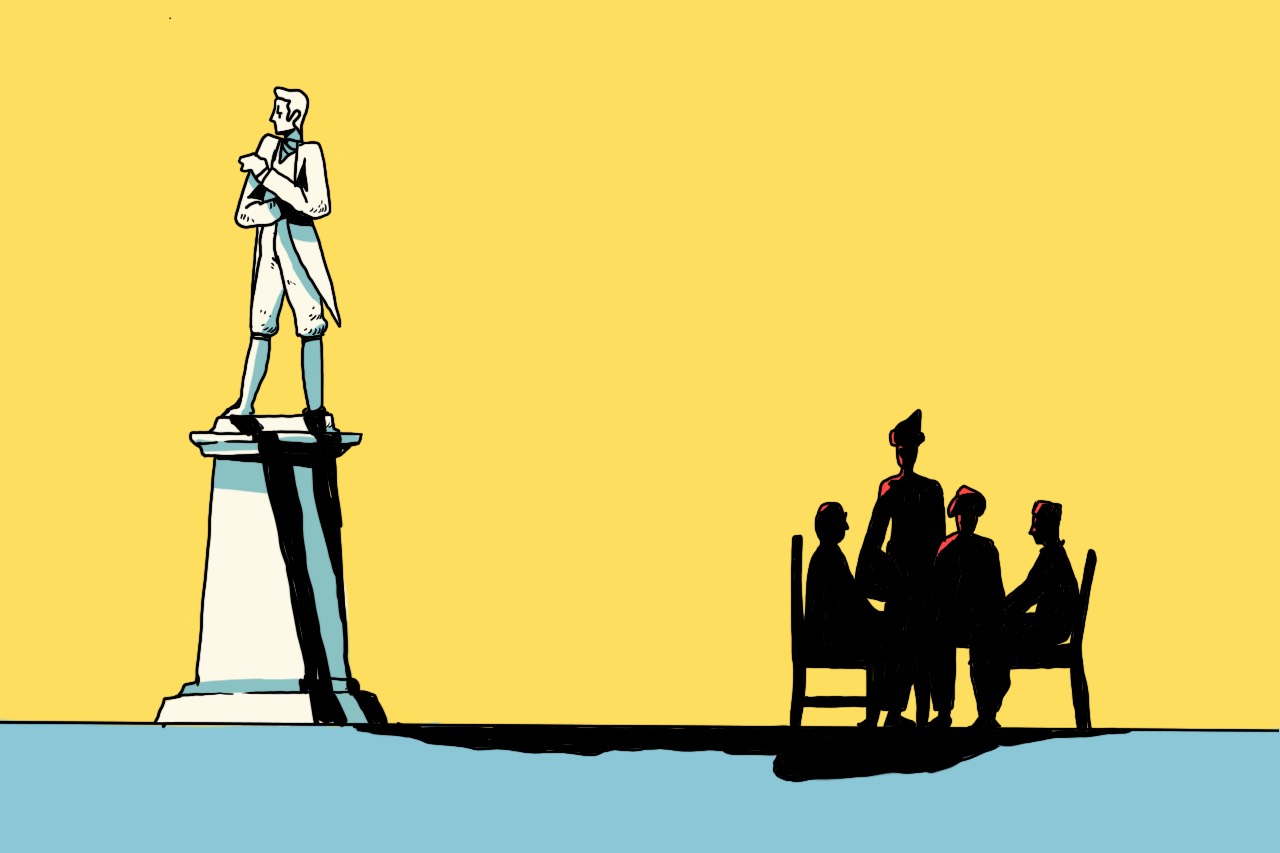Scene: Munshi Abdullah, Naraina Pillai, TTSH and Sang Nila Utama are sitting in a kopitiam, discussing Raffles and how he vanished.
Tan Tock Seng: Wait, wait what happened? Why are you speaking like a character from LOTR?
Munshi Abdullah: Raffles is gone.
Tan Tock Seng: Gone, as in, dead? Sorry to tell you, but Raffles has been dead for the past—
Munshi Abdullah: No, gone as in GONE. First, the statue disappeared from the Singapore river, and now everyone is talking about renaming Raffles Institution. God knows what’s next? Singapore Hotel? Bugis Hospital?
Tan Tock Seng: …
Tan Tock Seng: That’s all?
Munshi Abdullah: That’s all?? Raffles founded this country and built it into a prosperous trading hub. Before he came, it was all mangrove and tigers and—
Tan Tock Seng: I think you’re giving the man way too much credit.
Munshi Abdullah: Oh?
Tan Tock Seng: I mean, Raffles planted the flag and signed the treaty, but the island was inhabited all along. And please please don’t say he ‘built’ Singapore, the man didn’t build Singapore, no more than you or I did. In fact, I would say that you and I probably did more for Singapore.
Munshi Abdullah: That’s not true, you didn’t negotiate with Tengku Hussein, or plan the settlement or invoice the East India Company for money to build roads, warehouses or piers.
Naraina Pillai: Yeah, but neither did Raffles, to be honest.
Munshi Abdullah: I’m sorry, what?
Naraina Pillai: You are thinking Farquhar, not Raffles. Raffles was the man with a plan, it’s true, but he was just one man. A clever guy, for sure, but young for his rank and inexperienced.. He wanted to turn Singapore into a trading port, but a port is more than just deep water, it needs piers and godowns and labour and facilities to shelter your labour force.
Munshi Abdullah: Nonsense. Raffles was a good friend to you. He lent you money and gave you real estate in the CBD to rebuild your business after it burned down. And you slander him? My my.
Naraina Pillai: Oh, he’s a friend, for sure, but he also has his head in the clouds. After “establishing” Singapore, he sailed off and left us on the island without a roof over our heads or a bucket to shit in. I, who was a well-paid civil servant in Penang, had to downgrade to an attap hut while he went on his adventures.
Munshi Abdullah: I’m sure it wasn’t that bad.
Tan Tock Seng: Actually, it was. I don’t know what you remember, but I remember rampant crime, dirt roads, hordes of homeless people and disease, deadly epidemics everywhere. Those who weren’t stabbed or robbed, they died of diarrhea for the lack of real doctors.
Naraina Pillai: And when they died, there was no one to bury them.
Tan Tock Seng: So I had to raise the money to bury them, or at least as many as I could handle. Anyway, that’s not the point. The point is, Raffles bought the land, but it was the rest of us who had to build a house fit for human habitation.

Munshi Abdullah: Don’t talk cock, you made plenty of money from that brick kiln.
Naraina Pillai: Yeah, but only later on. These days, you call it a start-up. In my day, we just called it what it was: a shitshow. I had to write long whiny letters to craftsmen and bricklayers and guys I vaguely knew in Penang, convincing them that I’ve struck gold, but on an Island nobody had heard of …
Munshi Abdullah: … with a name that nobody could pronounce. Oh well, at least you did build a temple for the community later on.
Naraina Pillai: Sri Mariamman? Hah? The first version was just a glorified wooden hut. The roof leaked when it rained. Even so, it was Farquhar who signed off on it, not Raffles.
Tan Tock Seng: And the temple had to double as a homeless shelter for the jobless migrants who were fresh off the boat. Everything was so haphazard back then. Many people call me a saint for donating money to build Tan Tock Seng Hospital, but it was pure necessity.
Naraina Pillai: So anyone who could step in, had to step in, or else these whole house of cards would have fallen down.
Tan Tock Seng: Philanthropist heh. More like an unpaid Minister with a coconut business on the side. All the nonsense. If I knew what being Justice Of The Peace entailed, I would have demanded to be paid for the job!
Munshi Abdullah: You had a coconut business?
Tan Tock Seng: Not one of my better ideas, I’ll admit.
Naraina Pillai: What’s wrong with the Justice role? I thought it was pretty chill.
Tan Tock Seng: Job was alright. Chinese community was not. The Hokkiens couldn’t get along with the Hakkas, who couldn’t get along with Teochews, who hated the Hainanese, but not as much as they hated the Cantonese. Meanwhile, everyone was jealous of the wealthier Nyonyas like me. I got heartburn trying to figure out who gave offence and why …
Munshi Abdullah: Well. You guys can claim credit for being Justices and hospital-builders or social entrepreneurs so on. I was just a lowly PA in the grand scheme of things.
Naraina Pillai: Ay, don’t sell yourself short. You taught Raffles and half the influential people in Singapore how to speak Malay.
Tan Tock Seng: And for those who couldn’t be asked to learn, you spent day and night translating. Without your work, plans will go awry and the first Singaporeans would be quarrelling with swords instead of words.
Naraina Pillai: Yeah, and you knew almost every known language in Southeast Asia. People make a big fuss about Raffles speaking Malay, but you spoke Malay, Arabic, Tamil and English.
Sang Nila Utama: And don’t you forget, you wrote the Hikayat Abdullah!
Munshi Abdullah: Holy-, when did you arrive?
Naraina Pillai: And why are you not wearing clothes?
Sang Nila Utama: I’m Royalty. I can do whatever I like.
Tan Tock Seng: Yes, but-
Sang Nila Utama: Hush. The teacher is too modest. Teaching Raffles malay was important for sure, but not half as important as the Hikayat you wrote.

Sang Nila Utama: Bullshit. So would you say that my existence is completely pointless?
Munshi Abdullah: Yes, but you’re not a story. You’re a prince, a ruling member of the—
Sang Nila Utama: I may have existed, or I may not. But I most certainly did not spot a lion. Not even Daryl Aiden Yow could capture such a noble beast. And yet, every secondary school students knows the story of how I sailed here …
Tan Tock Seng: I think I’m speaking for the group here, but what exactly are you trying to say.
Sang Nila Utama: Haix, my point is… stories have a purpose. They don’t exist to just entertain. They offer us a means of making sense of the world around.
Naraina Pillai: So, the moral of your story is.. go out and seek adventure?
Sang Nila Utama: Eh no. Try again.
Munshi Abdullah: Is it … an allegory about the rewards of seeking out knowledge and how curiosity is its own reward …
Sang Nila Utama: Are you trying to smoke me?
Munshi Abdullah: … Can you just tell us the answer
Sang Nila Utama: Okay okay. My point is, the story of the lion and throwing my crown in the water might not be 100% true, but it gives Singapore a sense of destiny. A feeling that we are not just a rock in the middle of nowhere. About how the nation was made for greater things!
Munshi Abdullah: I don’t think my autobiography imbued Singapore with a — air-quotes— sense of destiny.
Sang Nila Utama: Well, not all stories serve the same purpose, but your realistic account was just as important. In a time when Raffles was hogging the spotlight, it showed the world that there was a Singapore beyond the heroic great men doing heroic things; a world of ordinary people whose lives and labour were no less important than Flag-planters. It also painted a portrait of Singapore as a real place, when Singapore was a nothingburger on the worldmap.
Munshi Abdullah: Or the lion-hunting princes?
Sang Nila Utama: Precisely, my boy, precisely. It’s all about the branding.
Tan Tock Seng: I still don’t get it.
Sang Nila Utama: Nevermind. Just remember that you are all important, albeit in different ways. So long?
Naraina Pillai: Wait, where are you going? You haven’t finished your tea!
Sang Nila Utama: A prince has more important duties!
Naraina Pillai: What a weirdo.
Munshi Abdullah: Well, he is about 700 years old.
Tan Tock Seng: But what he said was right. Singapore wasn’t built in a day, nor by one man alone. It’s time we let the cult of Raffles die. He was just a man. More adventurous than most, but certainly not smarter or more enterprising or more hardworking.
Munshi Abdullah: Perhaps so, but his legacy will be tough to snuff out.
Naraina Pillai: As is Singapore itself, heh.






